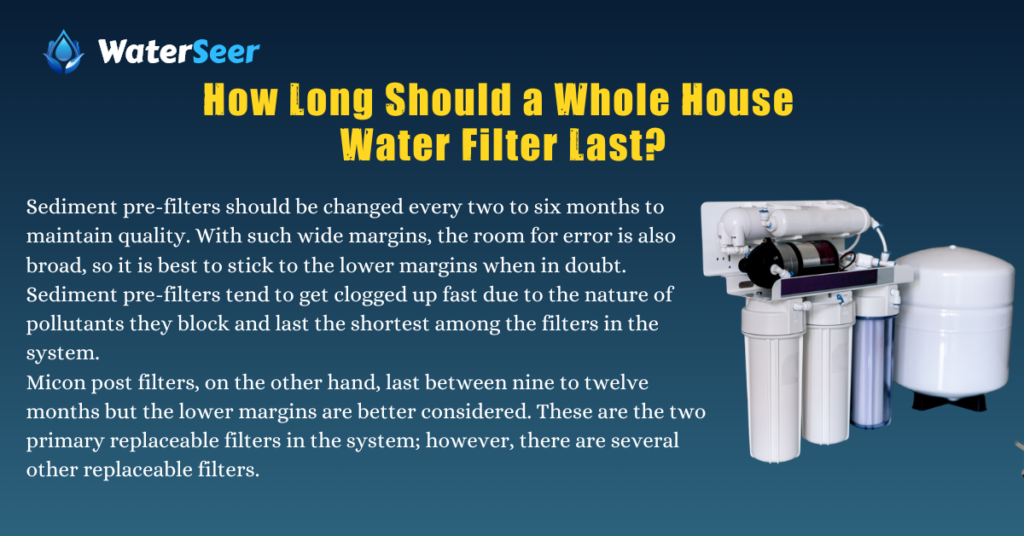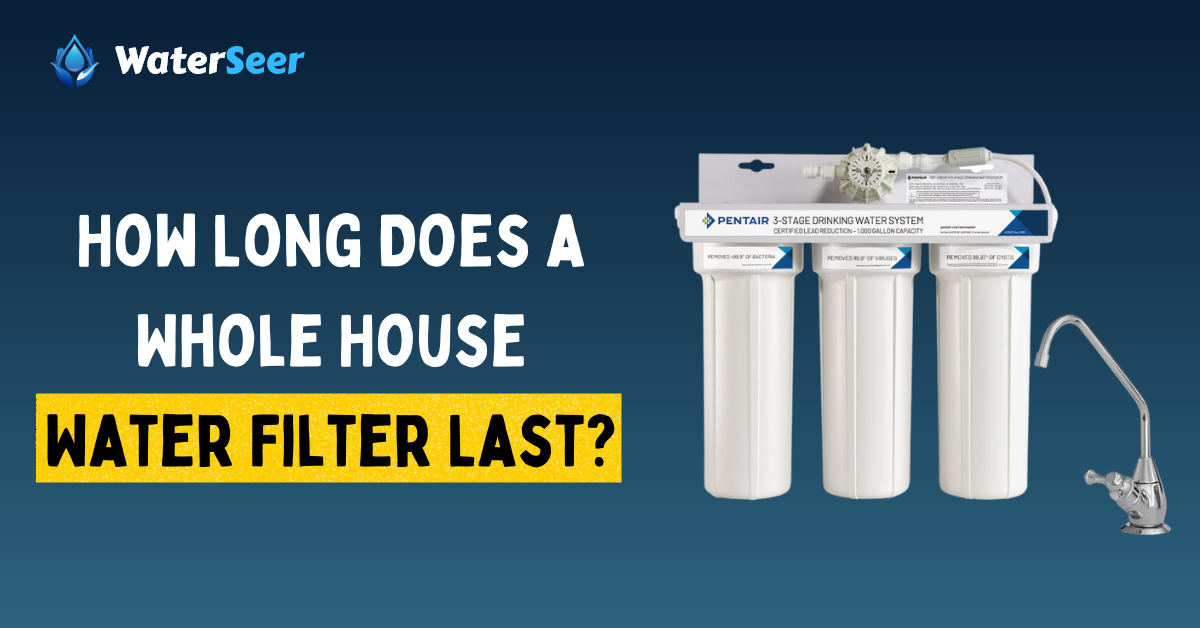Whole house water filters are connected to the main water line and purify the water coming into the house. After installing this type of water filter in your home, you would expect a decent usage period before it gets clogged with Dirt and cannot perform its work.
With such a big purchase and the ability to provide clean water throughout the house, its importance is evident but what about its longevity? Whether you’ve installed the whole-house water filter on a private well or from public water systems, the filters all have a limited usage period – but how long is this period? How long should a whole-house water filter last?
Since whole-house water filters will not last forever and their usage period is not set in stone, it is best to know their general effective period alongside some common factors affecting their longevity. This way, considering your peculiar conditions, you can correctly judge how long your home water filter will last. Before then, let’s see why it is vital to change whole-house water filters.
Why is Changing Water Filters Important?
Your whole-house filtration system contains one or more filters that clean the water entering your home. And as earlier established, these filters are not built to last forever. The filters require periodic changing to maintain their effectiveness in producing clean water across all faucets in your home.
These filters block the contaminants and prevent them from passing through into your home; the Dirt clogs the filters over time. You need to change the filters at the right moment to maintain their effectiveness. Otherwise, you’re back to getting contaminated or no water.
The main reason why changing filters is essential is to maintain their efficiency.
Sometimes, the filter is not clogged but still loses its effectiveness and no longer stops these pollutants. It means Dirt, rust, sediments, and more can pass through the now-weakened filters into your home without you being wiser. After establishing the importance of changing water filters, we should consider the filters in our whole house filtration system that we can replace.
How Many Replaceable Filters are There?
Since most water sources have numerous contaminants, utilizing filtration systems to clean the water thoroughly is necessary. Most whole-house filtration systems have multiple filters to remove different types of pollutants in the water. Not all of these filters are replaceable, with the number of replaceable filters varying based on the type of filter.
Typically, the sediment pre-filter is the only replaceable filter in most systems since it is the most common. The sub-micro post filter is also replaceable, although not all whole-house filters have them. Other filters, like Mineral and UV filters, will require expert maintenance for continual usage but still have a limited usage period. Testing the water first will help you know the type of filter you need and ensure you save resources installing filters with the capacity you do not need.
How Long Should a Whole House Water Filter Last?

Sediment pre-filters should be changed every two to six months to maintain quality. With such wide margins, the room for error is also broad, so it is best to stick to the lower margins when in doubt. Sediment pre-filters tend to get clogged up fast due to the nature of pollutants they block and last the shortest among the filters in the system.
Micon post filters, on the other hand, last between nine to twelve months but the lower margins are better considered. These are the two primary replaceable filters in the system; however, there are several other replaceable filters.
Systems with activated carbon filters that remove chlorine and other chemicals and catalytically activated carbon filters that remove stubborn chemical compounds like chloramines will see the filters last about twelve to eighteen months.
Whole-house filters like UV, ion exchange, and KDF filters last about one to three years. They last longer since the pollutants they block are smaller and take longer to clog the filter.
Filter tanks should also be replaced as they have a limited usage period, dependent on their capacity. Large filter tanks with 700,000 capacity typically last for seven years, while small tanks with 200,000 capacity last for about two years.
Owner’s manual and manufacturer’s instruction booklets will typically estimate how long the whole house filtration system is expected to last. These figures are sometimes exaggerated and should only be taken as a guide.
How Long Should a Whole House Filter Last When not Used?
If a whole-house filter has never been used after installation, it has no expiry date and will remain effective; however, this changes when the filter has been used even once. Once the filter comes in contact with moisture, even if left unused after the first encounter, it will require changing as the degradation will continue, albeit at a slower pace.
Factors Affecting the Longevity of Whole House Filters
Whole-house water filters may have general estimates of how long they should last but do not have an exact timeframe for all filters. The varying efficiency periods are due to certain factors affecting the filters. Here, we’ll consider the factors influencing how long a whole-house filter lasts.
Use
The frequency at which you use your whole-house filter will affect its lifespan. The filter’s limited lifespan starts when it comes in contact with moisture but can slow down when not used frequently. This means houses that use a high amount of water will see their filtration system last for a shorter period due to the more work and pollutants the filters must remove within that period.
Maintenance
Properly maintaining our whole-house water filter will prolong its usefulness. Maintenance starts with the correct installation, which is often neglected, especially by DIYers. Proper installation includes choosing a location free from harsh weather conditions and frequent human traffic. Ensuring no leakages from the filtration system and observing the water flow rate are ways to maintain your whole-house filtration system and prolong its lifespan.
Filter Type
Different types of filters in the whole-house filtration system have varying uses. The type of filter you have affects the longevity of your filtration system as some filters, like sediment pre-filters, last for only a few months, while others, like ion exchange filters, can last up to three years.
Filter Quality
The quality of the filter will affect how well and long it can continue to clean your water. Filter quality differs even among the same type of filters, with brands having varying quality levels. Sometimes quality differs even within the same brand and filter type due to defects and slight changes in conditions during production.
Water Quality
Water quality entering your home differs because there are different water sources with varying pre-treatment levels. Water from city storage facilities has been treated. It will likely contain fewer pollutants than a private well, typically full of minerals and sediments. The more pollutants your filter has to block, the shorter its lifespan.
Signs Your Whole House Filter is Past It
How do you know when your whole-house water filter needs replacements? The filtration system leaves cues that show when you need to change them.
- Odor: when you notice an unpleasant odor from the water in your home, this may be a sign that your filtration system is no longer effective
- Taste: water should be tasteless, so when water in your home begins to have an unpleasant taste, it should be that some pollutants have started overpowering your filtration system
- Mold or Dirt: Dirt or algae in your water indicates its ineffectiveness in tackling these impurities. When these impurities in the water are recent developments, the filter needs a replacement.
- Low water pressure: whole-house water filters are built with systems that do not inhibit water flow, so the water flow rate will not be affected when the filter is efficient. As the pores get clogged with impurities, the flow rate reduces until the water loses a significant amount of force. When this happens, you know the filter is past it and needs a replacement.
FAQs
You might find answers to your question about the longevity of your whole-water filter in this section.
Can I change a whole house water filter myself?
You can change your whole-house water filter with the right equipment. Following a straightforward guide on changing whole-house water filters, and instructions from the manufacturer’s manual, you can complete the process without damaging the filter or your plumbing.
Do you need a special drinking water filter after installing a whole house filter?
Installing a whole-house water filter does not clean the water properly for drinking. It removes general impurities and makes the water clean for bathing and brushing, among other activities. However, you’ll still need a particular filter to get clean drinking water.
Does a whole-house water filter reduce the water flow rate?
The structure of filtration systems inhibits the flow of water. But the rate at which whole-house filters affect the water flow is minute and negligible.
Summary
Whole-house water filtration systems do not last forever once they come into contact with water. Their limited lifespan is related to their effectiveness, so it is vital to know the general lifespan of your filter. Certain factors make it difficult to predict the exact time frame to change your whole-house filter. But with proper observation, you would know the right time to replace those filters. Remember, it is best to follow the lower margins when considering its lifespan.

